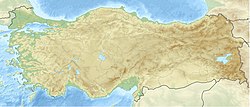
Back ملطية Arabic Malatya AST Malatya Azerbaijani Малат’я Byelorussian Малат’я BE-X-OLD Малатия Bulgarian Malatya Breton Malatya Catalan Малати CE مەلەتی CKB
Malatya | |
|---|---|
City | |
Clockwise from top: Malatya Aerial view, Kernek Square, Turgut Özal Nature Park, Malatya Governorship, New Malatya Mosque | |
| Coordinates: 38°20′55″N 38°19′10″E / 38.34861°N 38.31944°E | |
| Country | Turkey |
| Region | Eastern Anatolia |
| Province | Malatya |
| Government | |
| • Mayor | Selahattin Gürkan (AK Party) |
| Elevation | 954 m (3,130 ft) |
| Population (2022)[1] | |
| • Urban | 485,484 |
| Time zone | UTC+3 (TRT) |
| Postal code | 44xxx |
| Area code | 0422 |
| Licence plate | 44 |
| Website | www.malatya.gov.tr |
Malatya (Armenian: Մալաթիա, Malat'ia; Classical Syriac: ܡܠܝܛܝܢܐ, Malīṭīná; Kurdish: Meletî)[2] is a city in the Eastern Anatolia region of Turkey and the capital of Malatya Province. The city has been a human settlement for thousands of years.
In Hittite, melid or milit means "honey", offering a possible etymology for the name, which was mentioned in the contemporary sources of the time under several variations (e.g., Hittite: Malidiya[3] and possibly also Midduwa;[4] Akkadian: Meliddu;[5] Urar̩tian: Meliṭeia[5]).
Strabo says that the city was known "to the ancients"[6] as Melitene (Greek: Μελιτηνή, Melitēnḗ), a name adopted by the Romans following Roman expansion into the east. According to Strabo, the inhabitants of Melitene shared with the nearby Cappadocians and Cataonians the same language and culture.
The site of ancient Melitene lies a few kilometres from the modern city in what is now the village of Arslantepe and near the district center of Battalgazi (Byzantine to Ottoman Empire). Present-day Battalgazi was the location of the city of Malatya until the 19th century, when a gradual move of the city to the present third location began. Battalgazi's official name was Eskimalatya (Old Malatya); until recently, it was a name used locally. In Turkey the city is renowned for its apricots, as up to 80% of the Turkish apricot production is provided by Malatya, giving Malatya the name kayısı diyarı ("apricot realm").[7]
In February 2023, the city suffered huge damage as a result of the Turkey–Syria earthquake.[3]
- ^ "Malatya". citypopulation.de. Retrieved 23 January 2024.
- ^ Dr Abdulla Ghafor (2000). Kurdistan: Dabeshî Kargêrî Terrîtorî 1927-1997. Stockholm.
- ^ a b "Melid". Reallexikon der Assyriologie. Accessed 12 Dec 2010.
- ^ KBo V 8 IV 18. Op. cit. Puhvel, Jaan. Trends in Linguistics: Hittite Etymological Dictionary: Vol. 6: Words Beginning with M. Walter de Gruyter, 2004. Accessed 12 Dec 2010.
- ^ a b Hawkins, John D. (2000). Corpus of Hieroglyphic Luwian Inscriptions. Vol. 1: Inscriptions of the Iron Age. Walter de Gruyter.
- ^ Strabo Geographica, Translated from the Greek text by W. Falconer (London, 1903); Book XII, Chapter I
- ^ "Malatyalılar İstanbul'da Yürüdü". malatyaguncel.com (in Turkish). Malatya Güncel Haber. 11 July 2009. Archived from the original on 22 December 2015. Retrieved 12 October 2018.
© MMXXIII Rich X Search. We shall prevail. All rights reserved. Rich X Search




